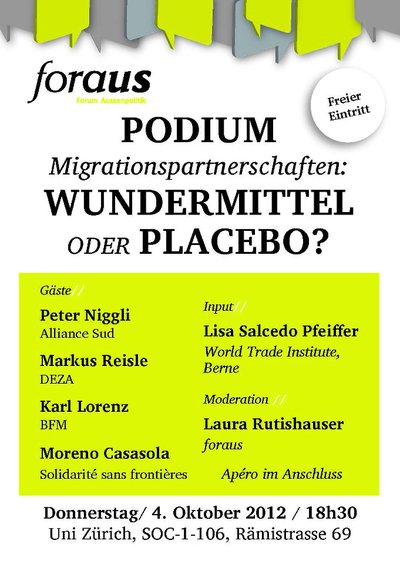4 Oct 2012
Reports/ Presentations
Salcedo Pfeiffer, Lisa
The Genesis of the Partnership Approach to Migration and the New Generation of Bilateral Migration Agreements from the perspective of France

Presentation by Lisa Salcedo Pfeiffer at the Foraus Podium on Migration Partnerships (Migrationspartnerschaften – Wundermittel oder Placebo?), University of Zurich, 4 October 2012.
Abstract
The new millennium has seen the rise of new tools for the management of migration flows, which reflect the desire of many developed countries for global circulation of skills in accordance with their labour market needs, as well as a growing concern for migration regulation. In contrast to other fields characterised by increasing flows in the globalised world, states still seem reluctant to resort to multilateral binding tools for migration management. Hence, in the recent years new solutions have proliferated at bilateral level. The common innovative feature of the new generation of bilateral agreements on migration is that they tend to operationalise a paradigm shift towards a logic of partnership, already known in the development discourse, and which is defined by “shared advantages” and “shared responsibility” between countries of origin and of destination in the management of migration flows.
Drawing on the example of the French bilateral “agreements on joint management of migration flows and solidarity development” (accords de gestion concertée des flux migratoires et de développement solidaire) signed since 2006, mainly with sub-Saharan countries, it elaborates on how these pioneer agreements reflect the EU Global Approach to Migration adopted by the European Council in 2005 and confirmed in 2006. This new comprehensive approach, initiated by France and Spain, is based on the notion of partnership and includes three clusters: the facilitation of regular migration (in particular labour migration), the fight against irregular migration, and the synergies between migration and development. This presentation thus addresses how the notion of “partnership” coincides with the Migration and Development dialogue, which has been formalised in the political discourse since 2005. It aims at contextualising migration partnerships within the broader context of international cooperation by analysing how the notion of partnership entered the field of migration policy through different formal and informal international arenas. Finally, it explains why the paradigm shift was necessary and what the implications of this new approach are in the field of management of migration flows.
* This presentation is based on the research conducted within the framework of the author’s doctoral dissertation “Towards a Partnership Approach to Migration? The New Generation of Bilateral Migration Agreements: the Perspective of France” under the joint supervision of Prof. Marion Panizzon (NCCR Trade Regulation, University of Bern) and Prof. Hubert Peres (CEPEL, University of Montpellier 1).
Further info
Foraus Think-Tank Website
Foraus Arbeitsgruppe Migration
Facebook Event
Event Flyer, PDF
Abstract in German, PDF

